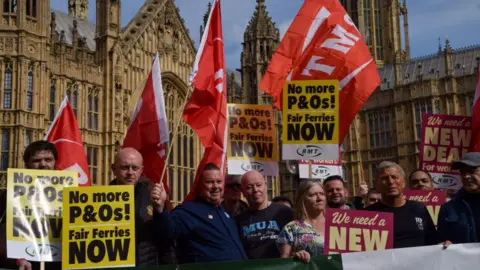After a torrid few weeks, Labour now has the opportunity to get on the front foot, and deliver on a major election pledge.
The government will fulfil their promise to bring forward legislation on workers’ rights within 100 days.
But in some cases employees will have to wait nearer to 1,000 days to enjoy new rights.
The new Employment Bill, published on Thursday, runs to 157 pages.
But despite the length, much of the devilish detail is yet to be decided.
Keir Starmer’s “changed” Labour Party has promised to be both pro-worker and pro business.
Trying to strike that balance means there will be further consultation on some of the bill’s key components.
Behind the scenes there has been a series of “roundtables” involving ministers, union officials – and sometimes their leaders – and business groups.
But one participant told the BBC that while there had been engagement with a broad range of groups, there had been little genuine consultation.
The legislation – as Labour has promised – will represent the biggest uplift in workers’ rights in a generation.
To be fair, this claim could be honoured just by abolishing Conservative legislation requiring minimum turnouts in strike ballots and minimum service levels during industrial action.
But many new measures won’t be introduced swiftly.
The bill itself is not expected to pass into law until June or July next year.
Consultations will continue on some issues beyond this – with changes implemented subsequently in secondary legislation.
And new rights to challenge unfair dismissal will not come in to effect until autumn 2026.
One business group has told the BBC they will continue to push their case during the consultation periods – “there will still be a fight, but the fight has been postponed”.
Probation period
Unions have asked for – and will be given – new rights for workers from day one of their employment.
This includes rights to sick pay, parental leave and to claim unfair dismissal.
The Federation of Small Businesses has pointed out that their members – rather than bigger companies – are likely to find this new regime the most difficult to cope with.
They don’t have big HR departments, and they can struggle to cover staff absences.
The small business group will continue to argue that anything that makes it more risky to employ new workers will be bad for growth.
Politically, that will make it more difficult for Labour to claim they are now the party of business and not just the unions.
So while there will be a right from the first day in work to claim unfair dismissal, the compromise the government has hatched is a “statutory probation period,” during which time it will be easier for employers to dismiss someone “fairly” than it would be after the probation period expires.
There would be a “lower bar” for employers, as one source close to the discussions put it.
The length of the probation period would be between six and 12 months – with the precise length to be battled over during a period of consultation.
The government’s preference is nine months.
Businesses are pressing for longer – and at least one union is calling for no probation period at all.
 Getty Images
Getty ImagesZero-hours contracts
There are other areas where attempts to be both pro-business and pro-worker will come under strain.
There will be an ongoing debate over the proposal to ban “exploitative” zero-hours contracts.
The government’s plan is that once an employee establishes a pattern of regular working over a 12 week period, an employer would be obliged to offer a regular contract of employment.
Workers who prefer zero hours would be able to refuse – there will be no obligation to accept.
Some business groups would prefer this to be “a right to request” rather than an obligation.
The Unite union is not pleased as it thinks that the word “exploitative’ will be used as loophole by some companies.
And Unite is also concerned that the practice of “fire and rehire” – getting rid of workers and re-employing them on lower pay and/or terms and conditions – will still be allowed in exceptional circumstances.
The union’s leader Sharon Graham has said ‘the legislation has more hols than a Swiss cheese’ and that it has fallen short of its ambition to make work pay
Some companies are also critical, for different reasons.
They will claim that new restrictions could make them unviable – and that poorer pay is better than no job for workers.
Too difficult?
A whole range of measures flagged in Labour’s pre-election “Making Work Pay” document – the supposed blueprint for the legislation – have been put in the “too difficult” box for the time being.
This includes measures to make it easier to ensure equal pay between in-house and “contracted out” staff who do similar jobs in public services.
There was also a commitment to create a “single status of worker” – in part to protect people who are technically self-employed but in fact largely work for one employer but with fewer entitlements than employees.
This is seen as legally complex and will be dealt with separately from Thursday’s legislation.
And the “right to switch off” phones, emails and texts at the end of the working day won’t necessarily be a “right” after all.
Instead, it’s likely the government will ask employers to come forward with “a code of conduct”. The measure won’t be in the bill.
When the bill is unveiled, Labour will hope that discordant voices – from Unite on the one hand to the Federation of Small Businesses on the other – are muffled by the sound of approval from most unions.
Many will hail a rebalancing of the relationship between employer and employee.
But when the applause dies down, behind closed doors many arguments will continue over many months.
And it’s unclear who will triumph when long periods of consultation close.
But for now, Labour will hope that the mere existence of new legislation will indicate the party does intend to honour its promise of “change”.


